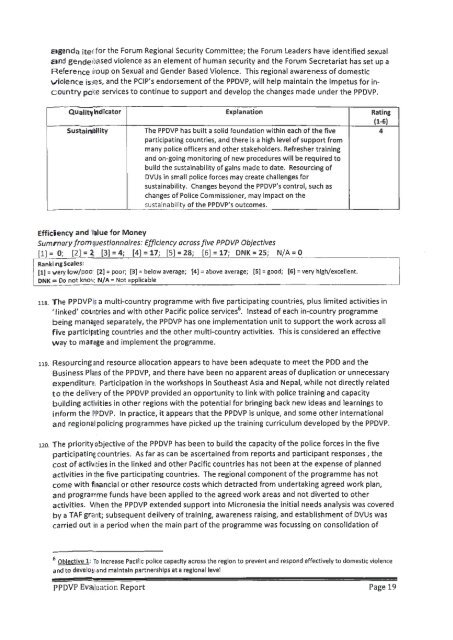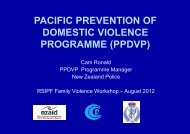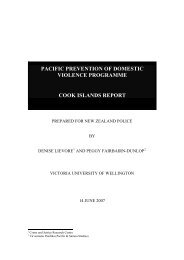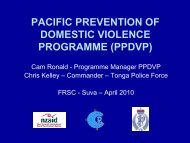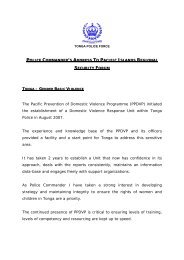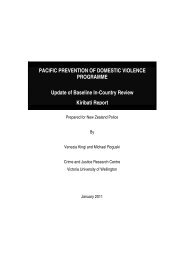PPDVP Evaluation Report - Pacific Prevention of Domestic Violence ...
PPDVP Evaluation Report - Pacific Prevention of Domestic Violence ...
PPDVP Evaluation Report - Pacific Prevention of Domestic Violence ...
Create successful ePaper yourself
Turn your PDF publications into a flip-book with our unique Google optimized e-Paper software.
agenda itelfifor the Forum Regional Security Committee; the Forum Leaders have identified sexualand genderbased violence as an element <strong>of</strong> human security and the Forum Secretariat has set up aReference Group on Sexual and Gender Based <strong>Violence</strong>. This regional awareness <strong>of</strong> domesticviolence is!ues, and the PCIP's endorsement <strong>of</strong> the <strong>PPDVP</strong>, will help maintain the impetus for incountrypo'ce services to continue to support and develop the changes made under the <strong>PPDVP</strong>.Quality IndicatorSustainlbilityExplanationThe <strong>PPDVP</strong> has built a solid foundation within each <strong>of</strong> the fiveparticipating countries, and there is a high level <strong>of</strong> support frommany police <strong>of</strong>ficers and other stakeholders. Refresher trainingand on-going monitoring <strong>of</strong> new procedures will be required tobuild the sustainability <strong>of</strong> galns made to date. Resourcing <strong>of</strong>DVUs in small police forces may create challenges forsustainability. Changes beyond the <strong>PPDVP</strong>'s control, such aschanges <strong>of</strong> Police Commissioner, may impact on thesustainability <strong>of</strong> the PPOVP's outcomes.Rating(1-6) .4Efficiency and Value for MoneySumrnory fromquestionnaires: Efficiency across five <strong>PPDVP</strong> Objectives[I] = 0; [2] = 2; [3] = 4; [4] = 17; [5] = 28; [6] = 17; DNK = 25; N/A = 0Ranki ng Scales:[I] =very low/poar. [Z] = poor; 131 = below average; 141 = above average; [5] =good; [6] =very hlgh/excellent.DNK = Do not kno~t: N/A = Not applicable11s. The <strong>PPDVP</strong>is a multi-country programme with five participating countries, plus limited activities in'linked' countries and with other <strong>Pacific</strong> police services6. Instead <strong>of</strong> each in-country programmebeing managed separately, the <strong>PPDVP</strong> has one implementation unit to support the work across allfive participating countries and the other multi-country activities. This is considered an effectiveway to manage and implement the programme.119. Resourcingand resource allocation appears to have been adequate to meet the POD and theBusiness Plans <strong>of</strong> the <strong>PPDVP</strong>, and there have been no apparent areas <strong>of</strong> duplication or unnecessaryexpenditure. Participation in the workshops in Southeast Asia and Nepal, while not directly relatedto the delivety <strong>of</strong> the PPOVP provided an opportunity to link with police training and capacitybuilding activities in other regions with the potential for bringing back new ideas and learnings toinform the <strong>PPDVP</strong>. In practice, it appears that the <strong>PPDVP</strong> is unique, and some other internationaland regional policing programmes have picked up the training curriculum developed by the <strong>PPDVP</strong>.120. The priorityobjective <strong>of</strong> the <strong>PPDVP</strong> has been to build the capacity <strong>of</strong> the police forces in the fiveparticipating countries. As far as can be ascertained from reports and participant responses, thecost <strong>of</strong> activities in the linked and other <strong>Pacific</strong> countries has not been at the expense <strong>of</strong> plannedactivities in the five participating countries. The regional component <strong>of</strong> the programme has notcome with financial or other resource costs which detracted from undertaking agreed work plan,and programme funds have been applied to the agreed work areas and not diverted to otheractivities. When the <strong>PPDVP</strong> extended support into Micronesia the initial needs analysis was coveredby a TAF grant; subsequent delivery <strong>of</strong> training, awareness raising, and establishment <strong>of</strong> DVUs wascarried out in a period when the main part <strong>of</strong> the programme was focussing on consolidation <strong>of</strong>Oblective 1: To Increase <strong>Pacific</strong> police capaclty across the region to prevent and respond effectively to domestic violenceand to developand malntaln partnerships at a regional level<strong>PPDVP</strong> ~viluation <strong>Report</strong> Page 19


